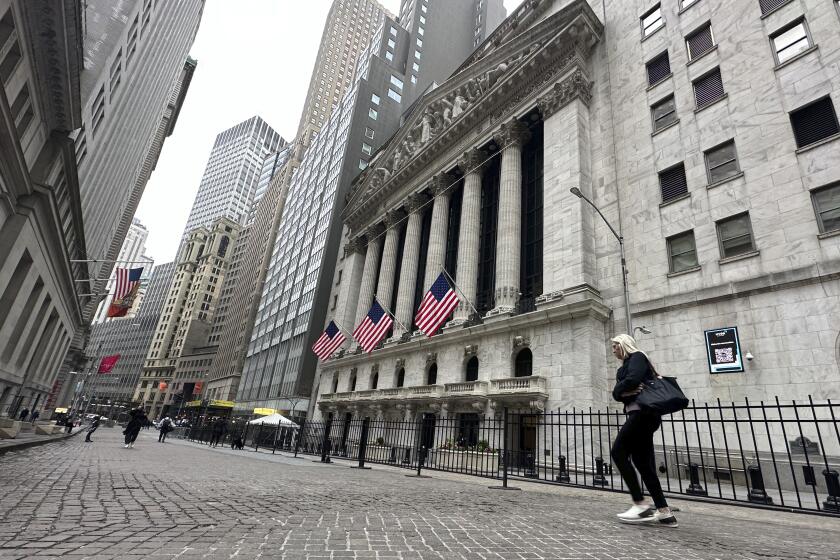Investment Champ Makes Big-Money Comeback
Robert Prion, who set the investing world on its ear when he was named overall winner of the 1987 United States Investing Championship at age 23, has scored a new victory in the prestigious annual competition.
Although he didn’t beat his record 232.6% gain, Prion, now a Garden Grove resident, has topped 100 investors to place first in the “big money” category in the 1989 contest. In capturing first place in the $50,000-and-over portfolio category, Prion--now 25--toppled three-time winner David Ryan of Pacific Palisades.
Prion, a corporate investment analyst for Westinghouse Credit Corp. in Newport Beach, used his iconoclastic approach to stock picking to swell his portfolio value by 133.9%, to $233,900 from the $100,000 with which he began the year. The results are based on the actual buying and selling of stocks.
Prion said he is neither a technical analyst, who relies on well-charted stock performance, nor a fundamentalist, who looks at bookkeepers’ numbers when picking companies to invest in. Instead, he uses his own procedure to develop an intrinsic shareholder value based on real and estimated corporate cash flow.
“I think that cash flow gets to the heart of a company and its ability to perform,” he said. “I look at a stock investment as if I was going to buy the company outright, then I determine the value per share. If that value is higher than the stock is selling for, I have found a good investment.”
Most of Prion’s gain in the contest came in the fourth quarter, with the strong advances of just four stocks in which he had taken large positions. Going into the third quarter, Ryan--who since has announced his retirement from the contest--was far ahead of the pack, said contest sponsor Norm Zadeh.
“But Prion gained about $100,000 just in the last three months,” he said, “while Ryan stayed flat.”
Zadeh is a former Stanford and UC Irvine professor whose Financial Traders Assn. in Beverly Hills has operated the investing championships since 1983.
Since then, more than 2,500 professional and private investors have entered the annual contests, competing for glory and the exposure that can bring them new clients with big accounts.
In the 1989 contest, private investor Dennis Ardizzoni of Dallas won the overall stock trading title with a 231.2% portfolio increase--not quite enough to beat the record set by Prion two years earlier. Ardizzoni competed in a category for portfolios of less than $50,000.
In the overall competition, Prion finished fourth, just ahead of Ryan.
Bob Kargenian of Placentia, a broker with Prudential Bache Securities in Anaheim, finished fifth overall: fourth in the $50,000-plus portfolio category in mutual fund investing, with a 26.3% gain, and ninth in the futures trading division, with a gain of 57.6%.
In a separate, ongoing contest for professionals managing portfolios of $1 million or more, Newport Beach investment manager Sheen Kassouf, a partner in Analytic Options Equity Fund, is in first place in the $50-million-plus category, Zadeh said.
Prion said that he was drawn to the United States Investing Championship in 1987 because he was developing a software program for individual investors and thought a victory or even a high-placed finish would be good publicity.
Although his record-setting win--he turned $5,400 into $18,000 during the year--did get him some publicity, his software was introduced just before the stock market crash of Oct. 19, 1987. “After that, there just wasn’t much market for the software,” he said.
Prion said that he stayed out of the 1988 contest “because I was disillusioned.” A year of quiet proved too much, however, and Prion said he decided to re-enter last year “just for the exhilaration of the competition.”
Prion’s introduction to economics came early: His father owns a machine shop outside of Pittsburgh, and talk about economic conditions was part of everyday life.
Then, when he was 16, Prion read economist Milton Friedman’s “Free to Choose” and became captivated by the interplay of the marketplace and public policy. He pursued that interest into Harvard, where he earned a bachelor’s degree in economics, and then into USC, where he obtained a master’s degree in business administration in 1987.
That is when Prion made the transformation from economic theorist to practitioner, working first for a firm that analyzed corporate buyout candidates and now for Westinghouse Credit, which specializes in financing leveraged buyouts.
Such buyouts, in which a company’s assets are used to help finance its acquisition, have lost some of their luster in the wake of the insider trading scandals of the 1980s and the collapse of the junk bond market last year.
But Prion is convinced that they will be back--in a big way.
Although he has made his mark winning big in the stock market, Prion said he believes that “we are going to see the eclipse of the public company.”
Leveraged buyouts will become popular with investors and lenders, he said, because the purchasers become an active part of management with a financial stake in the company’s performance.






